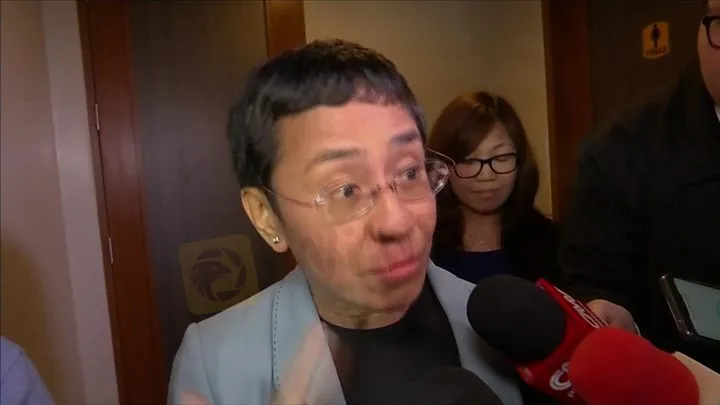简体中文
繁體中文
English
Pусский
日本語
ภาษาไทย
Tiếng Việt
Bahasa Indonesia
Español
हिन्दी
Filippiiniläinen
Français
Deutsch
Português
Türkçe
한국어
العربية
Maria Ressa: Head of Philippines news site Rappler freed on bail
Abstract:Media playback is unsupported on your device Media captionMaria Ressa says the rule of law was bro

Media playback is unsupported on your device
Media captionMaria Ressa says the rule of law was broken when she was arrested
Award-winning Philippine journalist Maria Ressa has been freed on bail, the day after her arrest on charges of “cyber-libel” drew international condemnation.
Ms Ressa is CEO of Rappler, a news website critical of the government.
She was arrested at its headquarters on Wednesday by agents from the National Bureau of Investigation.
Press freedom advocates see this as a government attempt to silence the news organisation.
Ms Ressa has been accused of “cyber-libel” over a seven-year-old report on a businessman's alleged ties to a former judge.
The charges - the latest in a string against her - carry a potential 12 years in prison.
AFP reports that bail was fixed at 100,000 pesos ($1,900; £1,470), and that it is the sixth time Ms Ressa has been obliged to post bail.
Who is Maria Ressa?
Ms Ressa is a veteran Philippine journalist who was named a Time Magazine Person of the Year in 2018 for her work holding power to account in an increasingly hostile environment.
She spent much of her career as a regional bureau chief at US broadcaster CNN before co-founding Rappler in 2012.
Rappler is known in the Philippines for its hard-hitting investigations. It is one of few media organisations that openly criticises President Rodrigo Duterte, regularly interrogating the accuracy of his public statements and condemning his sometimes deadly policies.
Image copyrightTED ALJIBEImage caption Maria Ressa was arrested at Rappler's headquarters in Manila
In particular, Rappler has published a number of reports critical of Mr Duterte's war on drugs, which police say has killed around 5,000 people in the last three years. In December, it also reported on his public admission that he sexually assaulted a maid.
What's the case against Maria Ressa?
The charges of “cyber-libel” relate to a seven-year-old report on a businessman's alleged ties to a former judge.
The libel law is controversial, and came into force in September 2012 - four months after her article was published.
The state of media in the Philippine
Why Rappler is raising Philippine press freedom fear
Officials first filed the case against Ms Ressa in 2017, but it was dismissed by the NBI because the one-year limit for bringing libel cases had lapsed. However, in March 2018, the NBI reopened the matter.
This new arrest comes just two months after Ms Ressa posted bail on tax fraud charges, which she says are also “manufactured”.
She could serve up to a decade in prison if convicted of just one count of tax fraud.
How has the world reacted?
Activists and press freedom groups around the world have criticised the Rappler CEO's detention.
Former US Secretary of State Madeleine Albright called it an “outrageous” arrest that “must be condemned by all democratic nations”.
Image Copyright @madeleine@madeleine
Report
Image Copyright @madeleine@madeleine
Report
Human rights group Amnesty International said the Duterte government was using legal threats to “relentlessly intimidate and harass” journalists.
Within the Philippines, the National Union of Journalists said the move would backfire, and called for protests to be held on Friday.
What does the government say?
President Duterte has previously denied that charges against Maria Ressa are politically motivated, but has publically branded Rappler a “fake news outlet” and banned its staff from covering his events. Last year, the state revoked the site's licence.
A spokesman for President Duterte insisted the government has nothing to do with the libel case, and does not pursue critical journalists.
“That's absolutely unrelated. The president has been criticised and he does not bother,” Salvador Panelo told DZMM radio.
Saying the unsayable: Philippine President Duterte
Duterte: The 'strongman' of the Philippine
Philippines country profile
BBC Philippines Correspondent Howard Johnson reports that journalists there are subjected to threats by supporters of the president, however.
Some argue that the press is biased against Mr Duterte, and that reports focus on his bloody drug war at the expense of his achievements while in office.
How has Rappler responded?
Speaking to reporters after her arrest, Ms Ressa said she was “shocked that the rule of law has been broken to a point that I can't see it”.
Footage streamed on Facebook showed plain-clothes party officials speaking with her, while several of the site's journalists live-tweeted what was happening.
Officers from the National Bureau of Investigations (NBI) reportedly ordered them to stop filming and taking photos.
Image Copyright @reyaika@reyaika
Report
Image Copyright @reyaika@reyaika
Report
Image Copyright @reyaika@reyaika
Report
Image Copyright @reyaika@reyaika
Report
Disclaimer:
The views in this article only represent the author's personal views, and do not constitute investment advice on this platform. This platform does not guarantee the accuracy, completeness and timeliness of the information in the article, and will not be liable for any loss caused by the use of or reliance on the information in the article.
WikiFX Broker
Latest News
CySEC Warns Against Unauthorized Investment Firms in Cyprus
Why Even the Highly Educated Fall Victim to Investment Scams?
Warning Against Globalmarketsbull & Cryptclubmarket
Dukascopy Bank Expands Trading Account Base Currencies
UK Sets Stage for Stablecoin Regulation and Staking Exemption
Axi Bids AUD 52M to Acquire Low-Cost Broker SelfWealth, Outbidding Competitor Bell Financial
Crypto Influencer's Body Found Months After Kidnapping
STARTRADER Issues Alerts on Fake Sites and Unauthorized Apps
Italy’s CONSOB Blocks Seven Unregistered Financial Websites
Bitfinex Hacker Ilya Lichtenstein Sentenced to 5 Years in Prison
Currency Calculator


